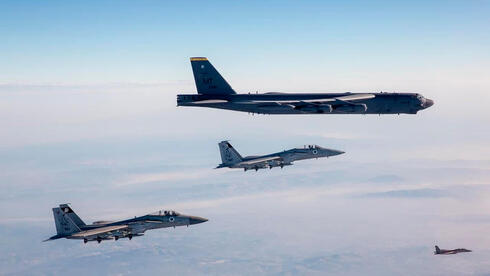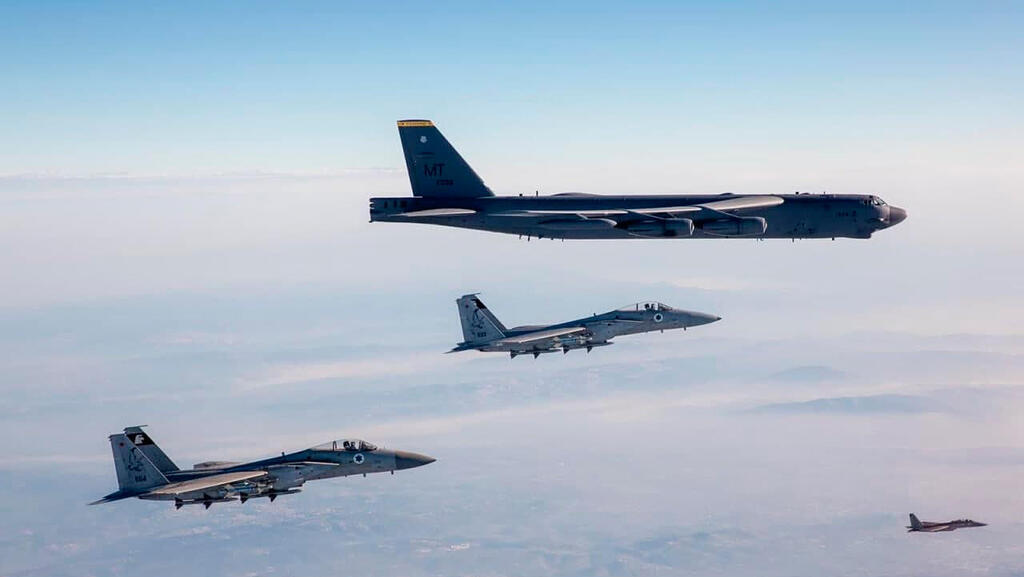
F-35s, helicopters, and the Iron Dome: Israel’s military runs on US Aid - So why is Netanyahu dismissing it?
Experts fear the Prime Minister’s comment was more than a slip of the tongue, and that it could damage Israel’s most important alliance.
Senior officials in Israel’s defense establishment and defense industries were astonished by Prime Minister Benjamin Netanyahu's comments last week during a meeting of the Knesset Foreign Affairs and Security Committee regarding continued U.S. security assistance to Israel. Netanyahu stated, "Israel receives about $4 billion in weapons from the U.S., and I think we will reach a point where we are weaned off of this, similar to how we weaned off economic aid."
While Israel is engaged in the longest and most complex war in its history, now lasting more than a year and a half and involving no fewer than seven fronts, the Prime Minister's comments seem out of touch with reality. In addition to the $3.8 billion annual grant provided under the current security assistance agreement, the U.S. has recently transferred another $5.2 billion to Israel through a special grant initiated by former President Joe Biden. These funds are being used to purchase large quantities of interceptor missiles for Rafael’s Iron Dome and David’s Sling systems, as well as to accelerate development of Israel’s new laser-based defense system, Magen Or (Iron Beam).
The existing security assistance agreement, signed in 2016, is set to expire at the end of 2028. Netanyahu’s remarks come at a sensitive moment, just as Israel is expected to begin negotiating the framework for a new aid agreement with Washington.
American military aid is a critical pillar of Israel’s defense capabilities. It finances the procurement of advanced combat systems like fighter jets, attack helicopters, and aerial refueling tankers, and subsidizes joint development programs between U.S. and Israeli defense industries, particularly in missile and rocket defense.
Virtually all of Israel’s fighter jets, their spare parts, much of their armament, as well as transport helicopters and refueling aircraft, are purchased from U.S. defense contractors using American aid funds. Effectively, Israel receives these advanced weapons free of charge, while other countries buying Lockheed Martin F-35s or Boeing’s latest F-15 models must pay from their own defense budgets.
Israel frequently touts its air force’s ability to strike targets in Iran and Yemen. But this operational capability is largely thanks to the billion-dollar faucet that Washington opens each year. As one senior official with deep experience in U.S.-Israel relations told Calcalist: "Let’s not bite off more than we can chew. Without the $3.8 billion in annual assistance, Israel would need to find alternative funding to acquire U.S. weapons."
Another defense industry source put it more bluntly: "Someone needs to shout at Netanyahu, 'You're crazy, come down from the tree.' I hope this was just a slip of the tongue, because it’s a terrible statement. The Israeli economy simply cannot afford to go it alone. If the Air Force needs to procure heavy transport helicopters or refueling planes, the government would need to pay from the national budget, as Canada, Britain, and Thailand do. It’s possible, but it would come at the expense of healthcare, education, welfare, and infrastructure."
Sources interpret Netanyahu’s comments as stemming from “panic and hysteria,” and warn they could severely damage Israel’s strategic relationship with the United States. His remarks csme just days before President Donald Trump’s visit to the Middle East, and amid U.S. diplomatic moves that appear to sideline Netanyahu entirely.
Trump informed Netanyahu about ongoing U.S.-Iran nuclear negotiations only during a public Oval Office meeting in front of journalists. More recently, Trump announced he would halt U.S. strikes on Houthi targets in Yemen, even as the Iran-backed rebels continue firing ballistic missiles at Israel, including a recent strike on Ben Gurion Airport.
Trump has also advanced Saudi Arabia’s civilian nuclear program without conditioning it on normalization with Israel and brokered a plan for the release of Israeli-American hostage Edan Alexander, again, without Israeli involvement. A senior Israeli official asked rhetorically: "We can assume Hamas received some kind of American promise as part of these understandings. And where is Israel in all this?"
In 2031, Israel is expected to receive its first F-15IA fighter jets from the U.S., part of a $5.2 billion deal funded entirely by American aid. Earlier this year, the Defense Ministry also signed a $3 billion deal for a third squadron of F-35s, to be delivered starting in 2028, adding 25 jets to the 50 already in service.
In parallel, Israel has also secured U.S. approval for the purchase of KC-46 aerial refueling aircraft and 12 new Sikorsky CH-53K transport helicopters to replace its aging Yas'ur fleet. These modern systems, built by Lockheed Martin and Boeing, are critical to Israel’s ability to strike Iran and other distant threats.
As one senior defense official put it: "Israel Aerospace Industries and Elbit don’t produce stealth fighters or long-range bombers. The only reason we have them is because the Americans give them to us, for free. We need to acknowledge that continued dependence on U.S. weapons is not just about equipment, but about deep industrial and economic ties."
Dr. Shay Har-Zvi, head of the International and Middle East Department at Reichman University, agrees: "The security assistance agreement expires in three years, and while Israel might eventually phase it out, doing so would have profound strategic consequences. It’s essential to begin talks with Washington about a new framework for assistance starting in 2029."
At the end of last year, the Commission for Evaluating the Security Budget and Force Buildup, chaired by Prof. Jacob Nagel, issued a report emphasizing the importance of a new aid agreement with the Trump administration. It noted that although the next agreement is not yet signed, the defense budget has already been “pre-strengthened” by nearly 50%, assuming aid levels continue.
"It is critical to sign a new agreement," the commission warned, "not only for its political and symbolic value, but because it underpins the IDF’s ability to procure key platforms, especially aircraft, helicopters, and munitions." The committee also cautioned that failure to reach a deal would force Israel to absorb the full cost of procurement contracts already signed on the assumption of future U.S. aid.














